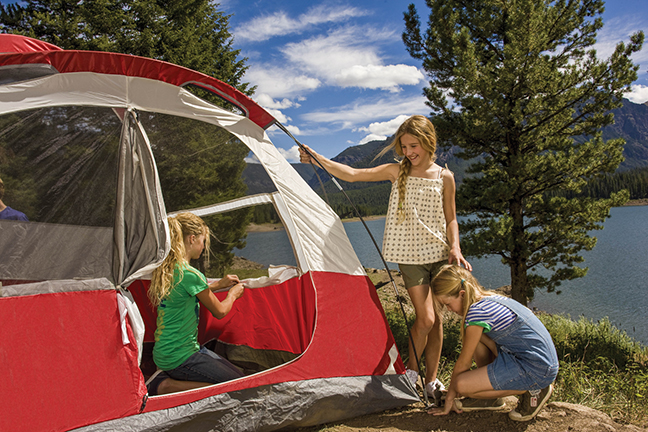Summer has arrived in full force here in Maine. Black flies, mosquitoes, and ticks are already swarming. Moose and deer are making their way into the road. Despite all of these critters, many people are ready to head for the woods and summer camps and campgrounds.
While camping can be fun, it’s not without risks. It’s important to plan ahead to ensure a safe vacation.
Dr. Bruce Bates, Director of the Maine CDC, said that it’s important to use caution when entering wooded or grassy areas like campgrounds where ticks may be present because of the prevalence of Lyme disease in Maine.
“To prevent Lyme disease and other tick-borne illnesses, the best protection is to avoid contact with ticks,” said Bates. “If you do find yourself working, playing or relaxing in areas that may have ticks, wear light colored clothing and long sleeves, use an EPA approved repellant and perform a daily tick check.”
Media relations manager for DHHS Emily Spencer said that CDC instructs people to walk in the middle of paths and to avoid rubbing up against bushes when walking in wooded or grassy areas. She said that when performing a tick check, they instruct people to pay special attention to their head, around and inside their ears, the hairline and neck, the armpits, the waist including the navel area, between the legs, the thighs, and behind their knees. Ticks in the nymph stage are very small so they advise people to take their fingers and feel the skin in those areas as well as visually inspecting the skin. CDC also recommends checking pets frequently for ticks. See ticksinmaine.com/prevention/tick-removal for more specifics on removing ticks.
Another area of concern when entering forested areas is driving safety. The Maine Department of Transportation reports that there were 291 moose crashes in Maine between September 1, 2016 and September 1, 2017. DOT reports that May and June are peak months for moose crashes in this state. They also report that most crashes occur between dusk and dawn because moose travel at night.
DOT recommends taking the following precautions when traveling in areas populated by moose:
Be alert in rural and forested areas.
Scan the roadside as well as the road when driving.
Pay attention and keep to the speed limit. Driver inattention and speed are often factors in moose crashes.
Don’t drive beyond your headlights. If you can’t stop within the distance of your headlight visibility, you could hit something just beyond your viewing area.
If you see a moose standing in or near the roadway, use extreme caution. Slow down. Don’t try to drive around the moose. Stay in your vehicle. Give the moose plenty of room and allow them to wander back off the road.
According to Maine DOT, if a crash is unavoidable,drivers should do the following:
Apply the brakes. Let up on the brake just before impact.
Try to aim at the tail of the animal.
Duck down to minimize injuries.
Becky Miller, co-owner of the Augusta/Gardiner KOA campground, said recently that caution should be taken when building campfires. Campers should only build fires within the designated fire rings and should never leave a fire unattended.
Miller said that it’s also important to be cautious about stray animals while camping because the animals could be dangerous and/or carry rabies.
“Stray animals (such as) foxes or raccoons could be a problem,” said Miller. “Always keep your food locked up at night in the trunk of the car or in the camper.”
The Augusta/Gardiner KOA Campground, located at 30 Mallard Drive in Richmond, is open April 1- November 30. They have four cabins and 74 campsites including both RV and tent sites.
Copy the Story LinkSend questions/comments to the editors.



Success. Please wait for the page to reload. If the page does not reload within 5 seconds, please refresh the page.
Enter your email and password to access comments.
Hi, to comment on stories you must . This profile is in addition to your subscription and website login.
Already have a commenting profile? .
Invalid username/password.
Please check your email to confirm and complete your registration.
Only subscribers are eligible to post comments. Please subscribe or login first for digital access. Here’s why.
Use the form below to reset your password. When you've submitted your account email, we will send an email with a reset code.